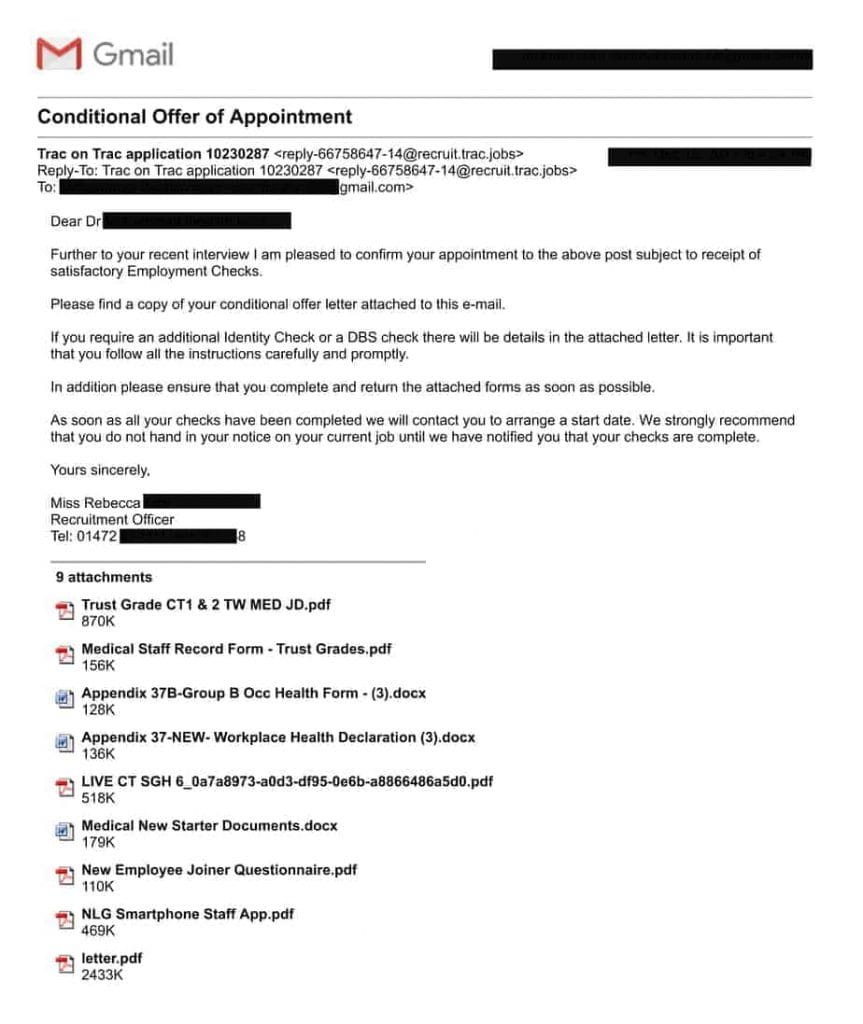The Interview: Finalizing your first NHS job

Congratulations! Finally, you have the job offer that you were waiting for, your very first job in the UK. The excitement and a nagging fear tug at the back of your mind.
What questions should I ask before accepting? Will it be okay to ask (this) and (that)? They asked me to send a lot of many documents. I don’t understand! When will I be able to apply for a TIER 2 Visa?
Conditional offer of employment
After an interview, the email that you will be waiting for is this, a “conditional offer of employment”.

What comprises Pre-employment checks?
The following are components of the pre-employment check which seek to verify that an individual meets the preconditions of the role they are applying for.
Identity check
This is generally done when you are physically present in the UK, right before commencing your job. They would want to see your real passport, BRP, proof of accommodation (tenancy agreement). So try to gather these things as soon as possible after you land in the UK. Remember that you can’t start getting paid if you don’t satisfactorily complete all steps of the pre-employment check.
Professional registration and qualification checks
A doctor’s professional registration is the GMC registration. If you are not GMC registered yet but are waiting for an ID check (that is to say your application is approved), you can send your HR the email in which GMC has invited you to attend an ID check. Bottom line, you will have to have your GMC registration before starting the job.
Employment history and reference checks
You gave your references when you applied for the job. If your Trust operates employment through TRAC, your referees will get a link to put their references. It is your duty to chase your referees and tell them to send their references to the Trust.
Right to work check
They have probably already done this before providing you with the conditional offer. If you don’t have a right to work, they will commence by providing you one by getting you a Certificate of Sponsorship so that you can apply for a Tier 2 visa.
Work health assessments
Vaccinations taken outside the UK or tests are done in a non-UK accredited lab don’t count. Not to worry, you won’t have to spend a penny running after privates labs. Your Trust’s occupational health department will arrange tests and vaccinations for you once you make an appointment with them prior to starting your job. They may need you to send them your previous vaccination records as well.
Criminal record check
If you have not been a UK resident for the last five years, DBS clearance does not apply to you. In that case, you will need to provide a police clearance certificate from your country. Some Trusts also accept Certificates of Good Standing.
Only on completion of these six checks will you commence your job.
Questions to ask the HR
As mentioned earlier, starting your first job is a huge step in your career, and we are here to guide you through what to make sure of before you are taking up an offer. One thing that needs to be clarified is that emailing is the best form of communication with your HR. Also, keep in mind that you don’t just HAVE to take what they are offering. You will be working for them, so you have some degree of negotiation you can wield.
Let’s move onto what queries to ask. Please remember that there are many questions to ask, so try not to be rude and ask a plethora of questions right away when they sent you a conditional offer of appointment. Be courteous, be polite, and ask your queries gradually in a conversational manner.
Politeness is to human nature what warmth is to wax.
Tier 2 visa application related queries
- Will the trust tick ‘Yes’ for maintenance in the CoS? If your trust is an A-rated Sponsor, it is likely they will tick Y for maintenance for you and your dependents. If they do, neither you nor your dependents will have to show any bank account for Tier 2 visa (That is a big relief). Unfortunately, if they don’t, remember that you will have to provide proof of £945 for 90 days for yourself and £630 for each of your dependents as maintenance.
- The duration of the CoS: Aim to get a 3-year CoS. You will have to pay for a TIER 2 visa up to 3 years anyway, even if your CoS is for 6 months. So, by getting a CoS for as much time as possible even if your contract is for 6 months, gives you less of a headache when you start your job. Remember that you can’t negotiate if it’s not in their policy, but asking never hurts.
So the length of your job contract and the length of your Certificate of Sponsorship, are usually the same. However, sometimes the contract can be for 6 months – 1 year WITH A CHANCE OF EXTENSION, in that case your employer can provide you with a longer length of CoS, to save them the hassle of applying for your sponsorship again, if extension happens following your initial length of job contract.
- The start date and end date in the CoS: Clarify with your HR that your visa application may take time and that’s why you need a start date that gives you some leeway. For example, if they are applying for your CoS in May, you can ask them to put the start date from the beginning to mid-July, which gives you the month of June to apply for the visa and prepare.
- What papers do they need for your CoS application? Some trusts have a form for you to fill up for your CoS application. Expediting the process of receiving your CoS should be your primary target after accepting a job.
Payroll related queries
- Basic and Gross pay: A proper clarification of your basic and gross pay (after adding the enhancements) is necessary before accepting an offer. Please read more about that at A Doctor’s pay in the UK for further knowledge and clarification about your pay.
- Negotiation: Some Trusts take your previous experience into account when setting up your pay. They also might give you a form to fill up and send them for consideration.
Relocation related queries
- Hospital accommodation: A very important query. For a new starter, staying in hospital accommodation is the best thing that can happen. Ask the HR, they will help you get into contact with someone who can manage it for you.
- How much you can claim for your relocation? Different Trusts have different policies, so a cursory question doesn’t hurt. If they are covering enough, you can opt for taking a comfortable cab from the airport instead of lugging your bags by train/bus.
Post-graduate Medical Education related queries
- Access to e-portfolios: If you have not got your foundation competencies signed, you can get that signed while you are working as a junior doctor (be it FY2 or CT1 level). Access to e-portfolio will also make your future core-training application better and organized. Horus e-portfolio is the one that is used by the doctors who haven’t got their foundation competencies signed.
- Access to teaching sessions, seminars, and courses: Ask about your degree of involvement.
- Provision for having Clinical Supervisor: You should ask about this while your interview as well.
Can I accept and then decline a job offer?
If you have not signed an employment contract you are legally allowed to change your mind. It’s better to decline an offer than it is to take it and quit shortly after. But it definitely can be an uncomfortable experience once they have started your paperwork (as you have accepted initially) to employ you and then you decline it.
- Think it through before declining the offer.
- Read the contract (if they have sent you one) to understand the terms and conditions.
- If you have decided to decline, don’t wait, do it today.
- Be concise, express gratitude and choose the right form of communication.
- Be honest but tactful not to belittle anyone.
If they have applied for your CoS already, then probably it is too late to decline. That’s why choose your words mindfully when you reply to the sweet email of getting the job in the first place to not give them a 100% answer that you have accepted the offer and you are happy for them to apply for your CoS. Rather ask your bit of questions, that we have discussed and then give them a 100% answer.
What happens after accepting the job offer?
So when all your queries are met and you are happy to accept the offer, your HR will start the process of pre-employment checks, as mentioned earlier. They will also apply for your Certificate of Sponsorship (CoS). After that, they will wait for you to apply for a TIER 2 visa and arrive in the UK. They will run the remaining checks after you arrive, and get you acquainted with your workplace and surroundings. They may arrange a two-three day induction to totally integrate you into the Trust. They will also help you get accommodation, a bank account, etc. You should never hesitate to ask for help or clarification if you don’t understand something.
TIER 2 visa and Job related clarifications
You will get a TIER 2 visa ONLY for the job that is mentioned on your Certificate of Sponsorship (CoS), which you will use to apply for the visa in the first place. Once you land in the UK, you will need to pick up your Biometric Resident Permit (BRP).
If you change your job to a different trust (or get into training), you will have to apply and pay for another Tier 2 again, but that you can do it from within the UK.
Please read these posts to know about the Online application for TIER 2 visa and Supporting documents for TIER 2 visa and How to apply for Tier 2 within the UK.
Congratulations again, and welcome to the UK!

